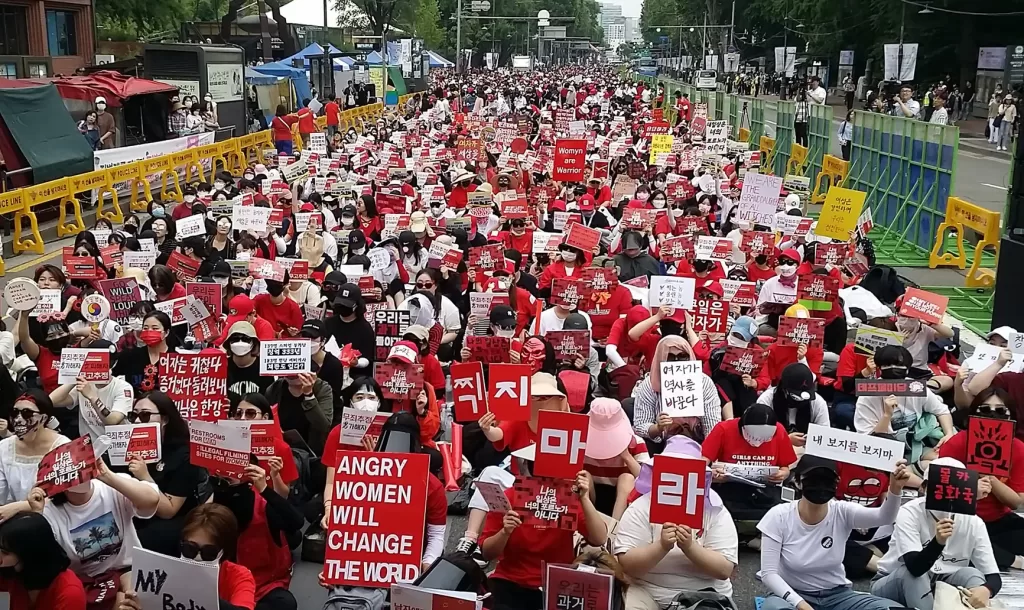
The 4B Movement, originally from South Korea, has recently gained attention in the U.S. following the 2024 election results, which projected Donald J. Trump as the winner. The movement, known for its radical stance against traditional gender roles and relationships—including rejecting dating, marriage, childbirth, and heterosexual relationships—has become increasingly appealing to some American women who see it as a form of protest against a political climate they feel undermines women’s rights.
This movement in South Korea arose from frustrations over the country’s deeply patriarchal society, where young women often face pressure to marry and bear children despite economic hardships and social expectations. The 4B Movement offers these women a way to reclaim autonomy by refusing to participate in traditional roles. In the U.S., some women view this approach as a powerful symbol of resistance against what they see as regressive political trends affecting women’s rights. As a result, discussions and support for 4B have surged on social media platforms, with many advocating for similar stances in the U.S. context International Business Times UK Wikipedia.
The ‘4B’ Movement’s alignment with anti-establishment sentiments in the U.S. reflects a broader frustration among some women who feel disenfranchised by the current political landscape. Many American supporters interpret it as a rejection of personal relationships and a stance against broader societal structures they view as oppressive. The movement’s polarizing nature has also sparked a cultural debate, as some critics argue it fosters division rather than productive dialogue. However, its appeal to those seeking a strong response to perceived social inequalities highlights the complex intersections of gender, autonomy, and political identity globally.
Introduction: What is the ‘4B’ Movement?
The ‘4B’ Movement, originating in South Korea, is a feminist response to traditional expectations around relationships and family roles. The name “4B” stands for four Korean terms: bihon (no marriage), bichulsan (no childbirth), biyeonae (no dating), and bisekseu (no sex with men). Advocates of the movement choose to reject marriage, romantic relationships, and family-building norms as a means of asserting personal freedom.
Following the recent U.S. election, where Donald Trump returned to office, interest in the 4B Movement has surged internationally. Some Americans, particularly those disillusioned with political shifts they view as regressive for women’s rights, are finding resonance with the 4B philosophy.
Why Did the ‘4B’ Movement Begin?
The 4B Movement arose as a response to deep-seated societal pressures in South Korea. Young women often face expectations to marry and start families, but with South Korea’s record-low birth rate, the government has made significant efforts to encourage family formation. However, these efforts are met with criticism from women who argue that society should prioritize gender equality and economic stability over pressuring women into traditional roles.
Key Principles of the ‘4B’ Movement
The movement’s four core principles are centered on rejecting traditional norms and avoiding the pressures that often come with them:
- No Marriage (Bihon): Members choose not to marry, often to prioritize personal freedom and career goals.
- No Childbirth (Bichulsan): Many reject the expectation to have children, emphasizing that this choice should be personal and not dictated by social expectations.
- No Dating (Biyeonae): By abstaining from dating, members seek to distance themselves from relationships they view as potentially reinforcing traditional gender roles.
- No Sex with Men (Bisekseu): This principle stems from a desire to break free from patriarchal expectations in intimate relationships.
Cultural Context and Social Pressures
South Korea has a longstanding patriarchal culture that influences its norms around relationships and family. High-profile incidents related to gender-based violence and workplace discrimination have further intensified conversations about gender equality. Books like Kim Jiyoung, Born 1982 by Cho Nam-Joo have added to the public discourse by spotlighting the everyday challenges Korean women face.
Impact of the Movement on Korean Society
While the 4B Movement has grown substantially, it’s important to understand its impact on Korean society as complex. On one hand, it provides women with a way to assert independence, but on the other, it may contribute to Korea’s low birth rate, which the government considers a demographic crisis. The movement reflects a broader societal shift where more individuals prioritize personal goals over traditional family structures.
Why Has Interest in ‘4B’ Risen Post-Election?
The 4B Movement’s resurgence in American interest after Trump’s election win may stem from increased concerns over women’s rights and autonomy in the U.S. Some see the 4B philosophy as a way to assert independence, particularly in a political climate they feel could impact women’s rights. This movement highlights a form of peaceful, personal protest that resonates with those who see autonomy and self-determination as vital.
Different Perspectives on the ‘4B’ Movement
Supporters of the 4B Movement argue that it’s an empowering choice that gives women control over their lives, challenging traditional gender roles. However, critics argue that the movement risks isolation and could exacerbate social issues, like the nation’s low birth rate. Some believe it may hinder relationships between men and women and challenge the very fabric of societal norms around family.
International Attention and Feminist Links
The 4B Movement has attracted global attention and sparked discussions about women’s rights. Similar to other feminist movements worldwide, 4B advocates push for a redefined concept of personal success that does not rely on relationships or family roles. While the movement is rooted in South Korean society, its principles resonate with individuals worldwide, especially those interested in challenging gender expectations.
Criticism and Concerns
Critics of the ‘4B’ Movement suggest that its approach may not be the only way to address societal issues. Some argue that reforming policies around gender equality, workplace discrimination, and family support could provide women with more options without rejecting relationships altogether. Others feel the movement’s radical stance may alienate those who support traditional family structures.
Conclusion: A Complex Social Movement
The ‘4B’ Movement in South Korea is a complex social phenomenon that challenges traditional gender roles and addresses issues around personal freedom, societal expectations, and demographic changes. While it has sparked renewed interest post-election, the movement’s motivations and impacts are varied and multi-dimensional, raising important questions about the balance between individual autonomy and societal well-being.
FAQs
What is the purpose of the ‘4B’ Movement?
The ‘4B’ Movement encourages women to reject societal expectations around relationships and family roles to prioritize personal autonomy and self-worth.
How has the movement affected South Korea’s birth rate?
The movement contributes to Korea’s low birth rate by promoting choices that often exclude childbirth, but the low birth rate also reflects broader economic and social challenges.
Why did the movement gain attention after Trump’s election win?
Some Americans, especially women concerned with perceived political regression, find the 4B philosophy resonant as a form of empowerment and resistance.
Does the ‘4B’ Movement exist in other countries?
While the 4B Movement originated in South Korea, similar ideas are present globally in various feminist movements challenging traditional gender roles.
What are common criticisms of the ‘4B’ Movement?
Critics argue it can lead to social isolation and may impact birth rates, while others believe it reflects broader societal frustration with gender inequality.
More Reads:
2024 US Election Results: Trump Clinches Victory in 2024 Presidential Race
Pregnant Texas Teen Dies After ER Visits: The Deadly Consequences of Abortion Bans


